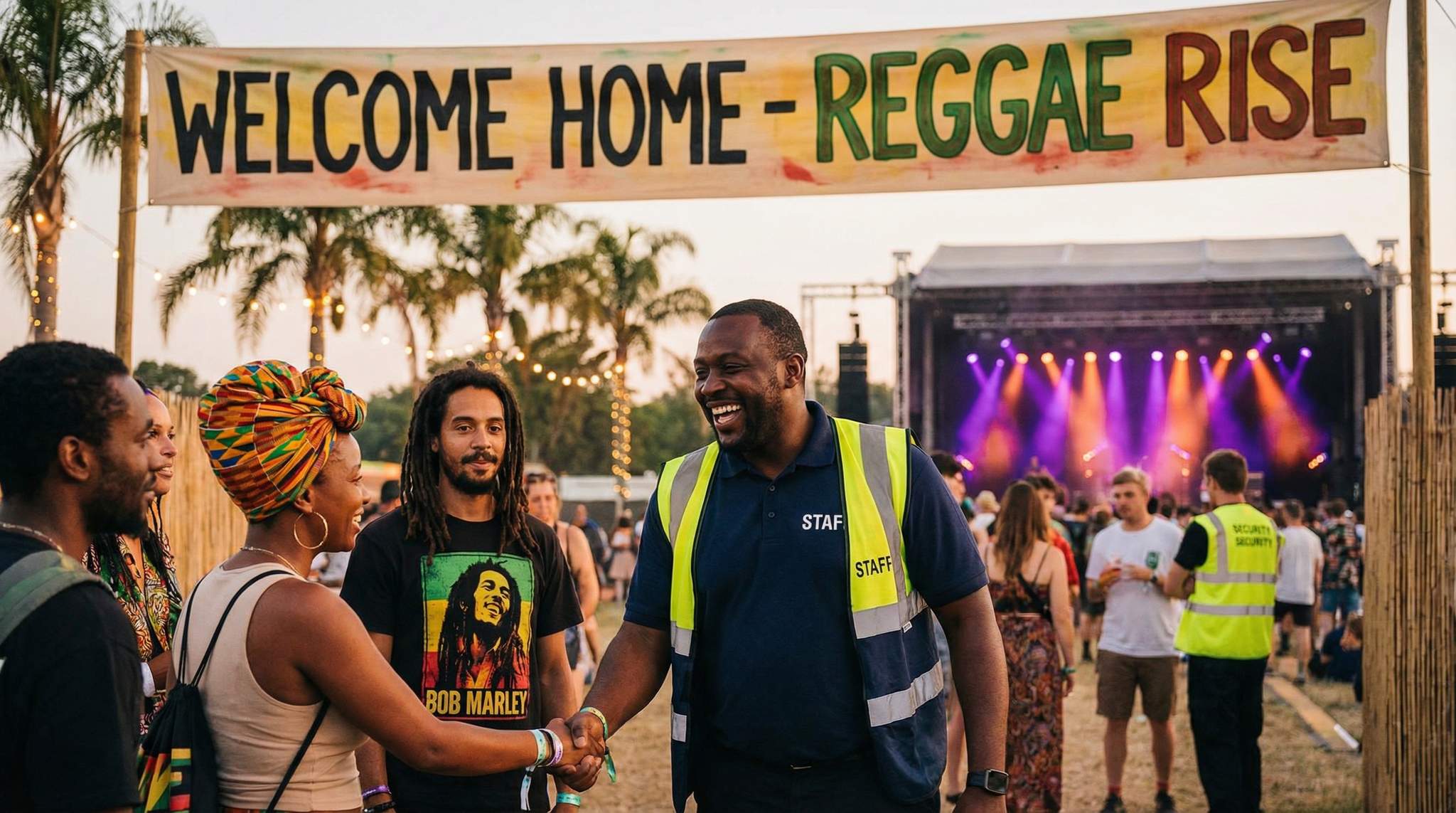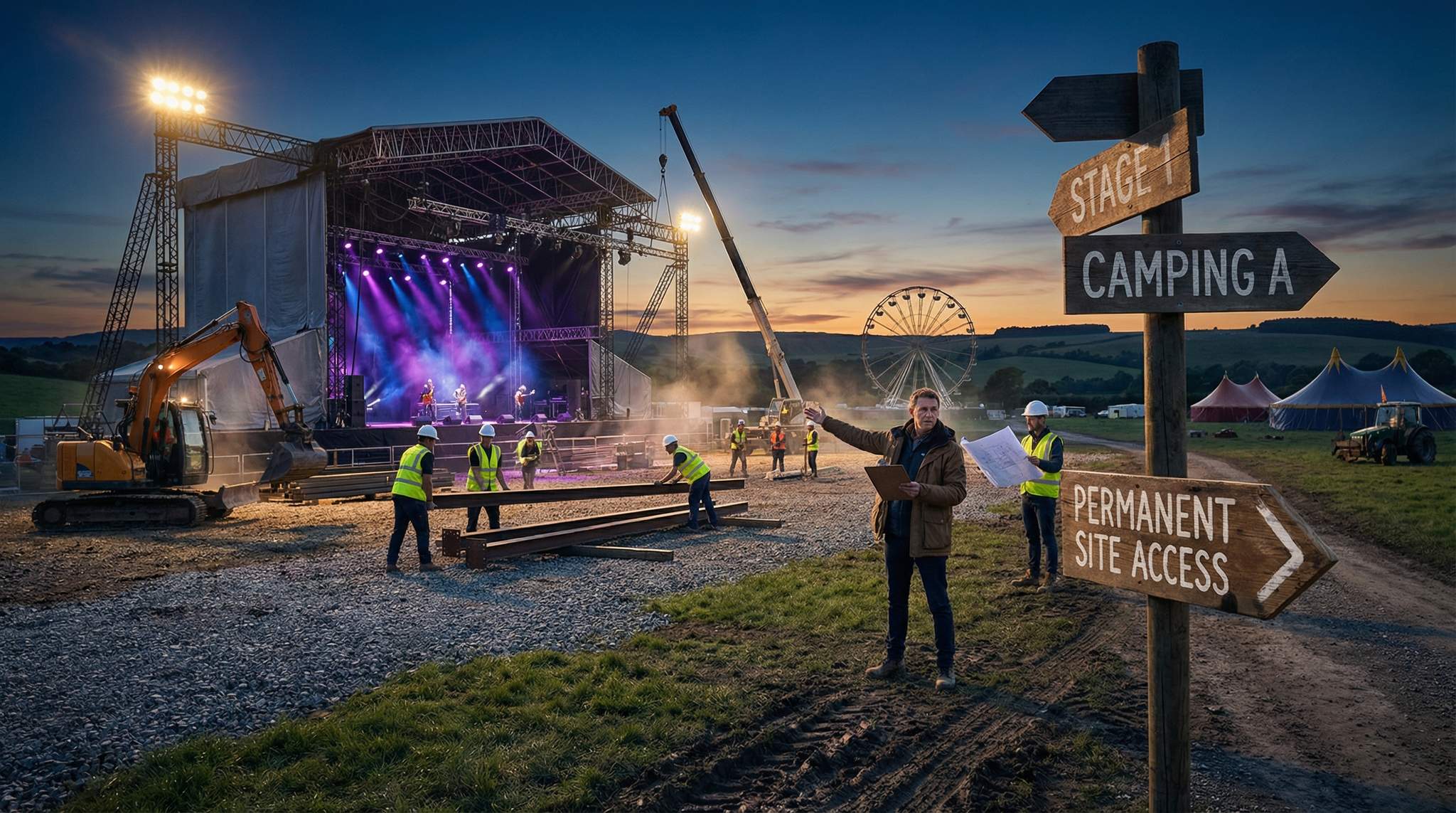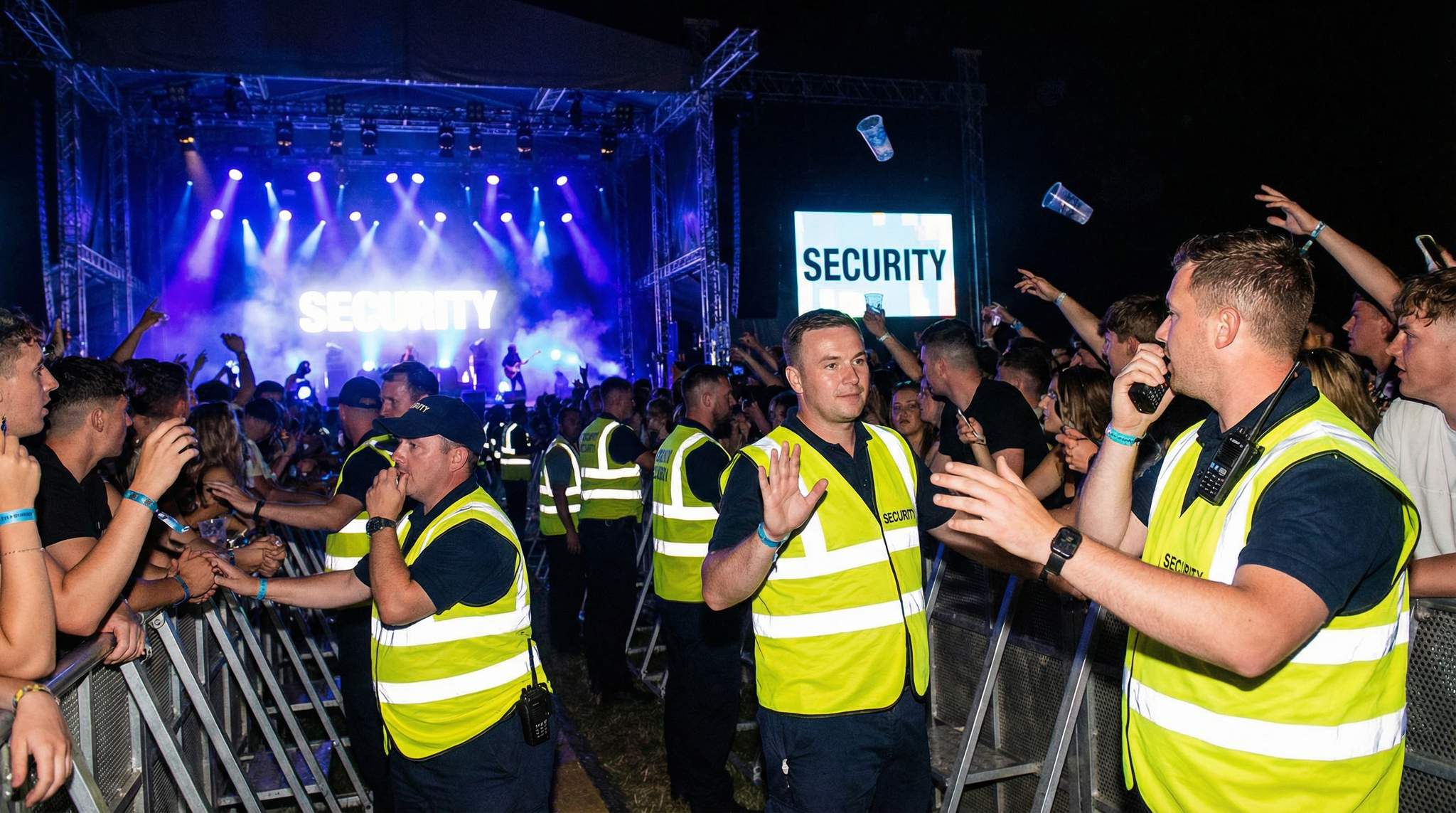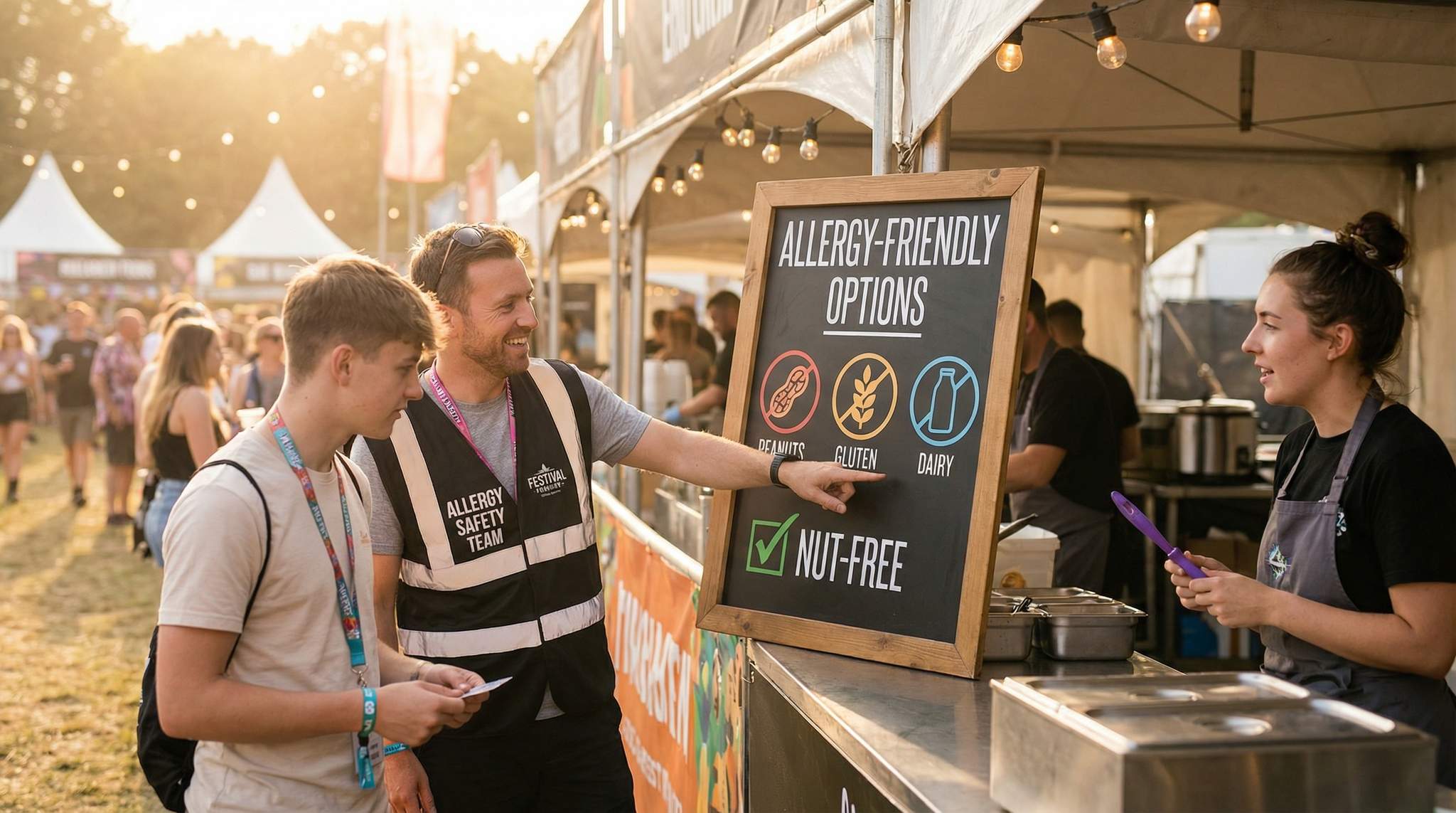Introduction
Festival-goers arrive excited for music, art, and community; the last thing they should feel is intimidated by security. The goal of event security isn’t just to enforce rules – it’s also to set a welcoming tone that makes every guest feel comfortable and safe. Around the world, from massive music festivals in the UK and USA to boutique cultural gatherings in Jamaica or Indonesia, seasoned festival producers recognise that how security personnel interact with attendees can make or break the festival experience. A welcoming security tone protects not only your attendees, but also the festival’s reputation and even its licence to operate.
Welcoming Security: Why Tone Matters
Security presence is essential at any festival, yet it need not be overbearing. The tone security staff set at the gates and throughout the venue significantly impacts attendees’ trust and enjoyment. A friendly, respectful security approach encourages guests to seek help when needed and to cooperate with rules. In contrast, an aggressive or indifferent posture can alienate your audience – they may feel unwelcome or even in danger despite being there to have a good time.
Many successful festivals have learned this through experience. For example, Glastonbury Festival in England, which hosts over 200,000 people, combines professional security contractors with volunteer stewards (often from Oxfam) who greet and guide attendees. This mix helps ensure the first faces festival-goers see are welcoming ones, not just authority figures. By setting a positive tone at the entrance, festivals large and small can start the event on the right foot. Attendees who feel respected are more likely to respect the event rules in return.
Hire and Train Security Teams in De-Escalation, Consent, and Cultural Competency
Achieving a welcoming yet effective security posture starts with hiring the right team and training them thoroughly. Whether you’re producing a 50,000-person reggae music festival or a local 5,000-person food fair, your security staff should be more than just enforcers – they need specialized soft skills:
-
De-escalation Training: Every guard or crowd manager should know how to calm down tense situations without force. In a crowded festival environment, conflicts can arise from misunderstandings, intoxication, or simple frustration (like someone bumping into someone else in a mosh pit or queue). Security personnel trained in de-escalation techniques use calm voices, non-threatening body language, and active listening to defuse incidents. For instance, if a scuffle breaks out near the stage at a concert in Mexico City, a well-trained staff member will approach slowly, speak gently (“Hey folks, let’s relax – we’re all here to enjoy the music”), and separate the parties calmly instead of charging in aggressively. This approach often prevents fights or panic, averting the need for physical intervention. Many festivals now include de-escalation workshops in their security briefing; it’s a practice that benefits events everywhere from Glastonbury (UK) to Electric Daisy Carnival (USA).
-
Consent Awareness: Security teams must also be versed in the principles of consent and personal boundaries. This applies to how they conduct searches and how they intervene with attendees. For example, when performing pat-downs or bag checks at the festival entrance, staff should always ask for cooperation and permission – “We’re doing a quick bag check for everyone’s safety, is it okay if I take a look inside your backpack?” – rather than wordlessly rummaging through belongings. They should also be trained to request same-gender staff to conduct any physical pat-down on a guest and to explain what they are doing and why. In festival environments, consent awareness extends to handling situations like potential harassment or unwanted physical contact among guests. A security member at a Pride festival in Canada or a large multi-genre festival in Australia should understand how to approach someone who may have been harassed, ensure they feel safe and supported, and get consent before taking any actions (for instance, asking “Do you want us to remove that person from this area?”). By respecting attendees’ personal space and dignity, security staff build trust.
Planning a Festival?
Ticket Fairy's festival ticketing platform handles multi-day passes, RFID wristbands, and complex festival operations.
-
Cultural Competency: Festivals often draw diverse crowds or centre on specific cultures, so security must be culturally competent. That means hiring or training teams to understand the values, customs, and communication styles of your audience. Imagine a reggae festival in Jamaica or Reggae Sumfest, where aspects of Rastafarian culture and a laid-back “One Love” ethos prevail. Security personnel working there should be familiar with reggae culture – for instance, knowing that many attendees may use casual language or slang, wear cultural attire, and possibly partake in cannabis as part of the reggae tradition. In another example, consider a festival celebrating anime and pop culture in Japan, or a multicultural festival in Singapore: the security team benefits from knowing a bit about the community – whether it’s common cosplay behaviours or local language basics. Cultural competency might involve language skills (having bilingual staff or translators for international festivals), sensitivity to religious or cultural norms (like understanding that some guests may not want to be touched, or recognizing when a gesture could be offensive). When security staff show respect for the culture of the event and its patrons, guests are more likely to comply with rules because they don’t feel targeted or misunderstood. A culturally aware approach can also prevent unintended escalations – for example, at a festival with many international visitors, a guest might not immediately understand an instruction in English, and a frustrated guard could escalate unnecessarily. But a culturally competent staffer will exercise patience or find a different way to communicate (even using translation apps or seeking a colleague who speaks the language) to resolve the situation smoothly.
Example: At Rototom Sunsplash in Spain, one of Europe’s largest reggae festivals, the festival’s organisers emphasise peace and tolerance. Security teams there are briefed to handle any rule enforcement – such as asking someone not to smoke in a no-smoking zone or moderate overly rowdy dancing – with a calm demeanor in line with the festival’s mellow vibe. Rather than barking orders, they might say “Enjoy yourself, yes – but please take care of those around you, we want everyone to feel the good vibes.” This kind of culturally tuned, respectful approach keeps the atmosphere positive while still keeping things under control.
Separate Security Screening from Guest-Help Roles
Another effective strategy to make security feel welcoming is to separate “strict security” duties from “guest service” roles, and brand each role clearly so attendees know who to approach. In practice, this means the staff who conduct bag searches, weapon screenings, or ID checks at the gate can be distinct from those who roam the grounds helping guests with questions or minor needs. Each group then focuses on their specialty and presents a different tone to patrons:
-
Dedicated Search Teams at Entrances: The guards at entry gates have a tough job – they must enforce prohibited items rules, check tickets or wristbands, and sometimes deny entry or confiscate items. These tasks can create tension right at the door. To keep lines moving and feelings positive, many festivals ensure these search teams are well-drilled in procedure and courtesy. They might wear a standard uniform that signals authority (like a security vest or shirt), but they are trained to greet guests with a smile and a “welcome to the festival” before getting into the security screening. By focusing these staff on the screening alone, you maintain a high level of alertness for risks while still expecting them to be polite and efficient. Some events also play cheerful music or have colourful signage at the security checkpoints to lighten the mood – the idea is to communicate “this is for everyone’s safety, and we appreciate your patience” nonverbally.
-
Guest Services and Helpers: Once past the checkpoint, attendees often need to find stages, water stations, campsites, etc., or they might run into minor issues during the event. It helps tremendously to have a separate team of clearly identifiable guest service staff or volunteers whose sole job is to assist and welcome attendees. These folks can have a different uniform or T-shirt (often a bright colour with “Here to Help” or “Crew” printed on it, distinct from security uniforms). For example, at large US music festivals like Electric Daisy Carnival (EDC) or Coachella, you’ll find staff designated as customer service or “Ground Control” (in the case of EDC) who roam in easily spotted outfits, handing out water, giving directions, and keeping an eye out for anyone who might need help or look uncomfortable. They do not enforce rules or conduct frisks – instead, they act as the friendly face of the festival. If they see a potential security concern, they can radio the security team, but they themselves approach attendees in a purely helpful manner. This division of labour means that guests aren’t confused about why the person helping them with a lost phone is also trying to police them – each staff member has a clear role. It also means the “security” people can remain focused on safety issues, while the “helpers” focus on hospitality.
-
Branding and Communication: Make it obvious who is who. Use signage and festival guides to explain: e.g. “Have a question or need help? Look for our Yellow Shirt Guest Ambassadors!” Meanwhile, perhaps your security have a different colour or are labeled “Security” clearly. At Glastonbury, as mentioned, thousands of volunteer stewards in distinct tabards help direct foot traffic and answer questions, creating a friendly atmosphere, while the trained security guards handle crowd control and incidents separately. Smaller festivals can do this too: even if your team is just 20 people at a local food festival in New Zealand, you can designate a few as the official “Help Crew” with a special badge or shirt, separate from those doing bag-check at the gate. This clarity prevents festival-goers from associating every staff interaction with a potential scolding or search. Instead, they’ll learn that some staff are there purely to make their day easier.
Need Festival Funding?
Get the capital you need to book headliners, secure venues, and scale your festival production.
By separating these roles, festivals strike a balance: Attendees feel cared for and see plenty of smiling staff available for help, while the necessary enforcement duties are handled professionally in the background. One outcome of this approach is that guests often show more respect to the security team when they do need to intervene, because the overall environment has been one of mutual respect rather than an authoritarian vibe.
Use Respectful Language and Scripts for Common Scenarios
Even the best-trained security personnel can benefit from having agreed-upon respectful language for common interventions. Festivals should treat their security communications like customer service interactions – with prepared phrases and a polite tone that align with the festival’s welcoming atmosphere.
Consider developing a “security script” or set of guidelines that covers frequent scenarios:
– ID Checks & Wristbands: Train staff to politely verify age or tickets. Instead of a gruff “ID!”, instruct them to say, “May I please see your ID to verify you’re over [age]? Thank you.” A smile and courtesy go a long way, especially for younger attendees at a festival in the United States where 21+ wristbands for alcohol are common. A respectful request makes the process feel routine and non-accusatory.
-
Bag Searches and Pat-Downs: As mentioned under consent, scripting a friendly explanation is key. For example: “Thanks for your patience – we’re doing a quick bag check to keep everyone safe. Do you have any sharp objects or glass bottles? No? Great, you’re all set – enjoy the festival!” This kind of patter keeps things moving and treats the guest as a collaborator in safety, not a suspect. If something needs to be confiscated (say outside alcohol or a prohibited item), the language can be: “I’m sorry, this item isn’t allowed on site per our policy. We can’t let it in for everyone’s safety. You have the option to take it back to your car/tent now. Thanks for understanding, we really appreciate it.” This is firm but polite and provides a reason, so it feels less like an arbitrary power trip.
-
Directing Crowd or Correcting Behaviour: There will be times security must tell attendees to change their behaviour (e.g., climbing on structures, smoking in a non-smoking area, trying to access VIP areas without permission, etc.). Here, tone is everything. Teach security staff to lead with a friendly greeting or concern, and a reason. For instance, “Hey there, I know it’s tempting to get a better view, but for your safety we can’t have anyone on this railing. Would you mind coming down? We don’t want you getting hurt.” Or “Hello! Sorry, this section is actually for artists and crew only. I can’t let you through here – it’s to keep the performers safe. Thanks for understanding, the public entrance is over that way if you’re looking for the stage.” Notice the use of apology (“sorry”) and thanks – it shows respect. In many European countries like Germany and France, a polite approach by security is actually expected as the norm; barking orders can even provoke attendees to push back. By scripting courtesy, you make sure even staff who are not naturally people-people use language that de-escalates and maintains a peaceful vibe.
-
Intervening in Altercations or Ejections: When things do get heated – say two guests are fighting, or someone must be removed for serious misbehaviour – security can still maintain respect. Scripts here might involve identifying themselves and showing concern: “I’m with the security team, and I’m here to help keep everyone safe. What’s going on?” Listening to each person briefly and then calmly stating, “I understand you’re upset, but this behaviour can’t continue because we want everyone to enjoy the show safely.” If removal is needed: “I’m very sorry, but I have to ask you to leave the festival for today. We cannot allow [explained behaviour]as it’s unsafe. We’ll escort you out now to make sure you’re okay. Let’s do this the easy way.” Using please, thank you, and I’m sorry at appropriate moments, even during an ejection, treats the person with dignity. Surprisingly, this respectful approach often results in less resistance – people realise the staff are just doing their job fairly. Major festivals in the UK, for example, instruct security to always use “reasonable force” only as a last resort; by trying a respectful verbal intervention first, they often avoid force entirely.
-
Addressing Sensitive Issues: In cases like suspected harassment, medical emergencies, or if someone looks very uncomfortable, security or dedicated safety volunteers should have empathetic scripts. E.g. approaching someone who might have been harassed: “Hi, I just want to check on you – are you okay? Do you need any help or want to talk to someone? Anything you tell us will be handled with respect and care.” Or if a festival-goer appears severely intoxicated or ill: “Hello, you don’t look so well. We’re here to help – can I bring you to the medical tent or get you some water and a quiet spot to sit?” This kind of approach prioritises the person’s wellbeing rather than immediately blaming or scolding them for being too drunk or breaking rules.
By preparing these kinds of model phrases and attitudes during training, festival organisers ensure consistency in how security interacts with guests. The idea isn’t to have guards sound like robots reading a script, but rather to give them a toolkit of respectful language. Role-playing common scenarios during pre-festival training can be very effective – staff get to practice the phrasing until it feels natural. Senior security supervisors and event managers should lead by example here: use the same respectful tone with their teams, and emphasise that kindness is an expectation, not an option.
Conduct Nightly Reviews of Incidents (Body-Cam Footage & Logs)
Even with great hiring, training, and scripts, real-life festivals will throw curveballs. It’s crucial to review security incidents daily (or after the event) to continuously coach the team and refine approaches. Many experienced festival producers run nightly debriefings with security team leaders, especially during multi-day events.
Here’s how to implement this:
– Incident Logs: Make sure every significant incident or intervention is logged. This could be done through radio reports compiled by the security control centre or written reports filed by team leaders. For example, if three separate scuffles occurred on day one of a festival in Sydney, those go into a log with basic details (time, location, summary of what happened, outcome). If a particular entrance had many attempts of contraband smuggling or lots of frustrated guests, note that too.
– Body Cameras: If security personnel use body-worn cameras (a practice now common at large festivals and concerts in the US and Europe), supervisors can review random clips or any footage related to a complaint. For instance, if an attendee in Germany reported that a guard was rude to them, the manager can check that footage to see what was said and how the situation was handled.
– Team Debrief Meetings: After each festival day (or at the end of a single-day event), gather the security supervisory team – and even front-line staff if feasible – for a quick review. Discuss what went well and what needs improvement. Did the team encounter any situations where they weren’t sure how to respond? Was there an instance of exemplary de-escalation that others can learn from? Perhaps one festival volunteer successfully talked down an angry guest who was upset about a long line – sharing that story can coach others. Alternatively, maybe at the entrance, staff noticed that a particular phrasing caused confusion; the team can adjust the script for the next day. These nightly check-ins also reinforce accountability: everyone knows their actions might be discussed, which encourages them to stick to the respectful protocols.
– Coaching and Recognition: Use the review to coach individuals who may have slipped. If body-cam or observer notes show a security guard speaking harshly to a guest, a supervisor should address it immediately in private: re-train them on the preferred language or approach before the next shift. On the flip side, recognise and praise staff who handled situations exceptionally well – positive reinforcement boosts morale and encourages others to follow that example. For instance, if a security member at a Canadian festival expertly helped a lost child reunite with their parents, commend them and possibly mention it to the whole team. These stories highlight the festival’s values in action.
By reviewing incidents and footage, festival management stays proactive. Small problems in tone or procedure can be corrected before they become big problems or viral moments on social media. It also shows the security team that management has their back and is invested in their professional growth, which in turn leads them to take pride in doing their jobs well and kindly. Over time, this continuous improvement cycle creates a strong security team culture aligned with the festival’s welcoming ethos.
How Respectful Security Protects Your License and Your Legend
Implementing a welcoming security tone isn’t just about being nice – it directly contributes to a festival’s long-term success. In many countries, event permits and licences depend on event organisers demonstrating effective safety and security plans. A security team renowned for professionalism and respect can reduce the number of violent incidents, medical emergencies, or complaints that authorities review after the event. Fewer incidents mean a higher likelihood of getting your licence renewed annually with less hassle. No city council or local government wants to approve a festival that has a history of brawls, excessive force by bouncers, or mistreated attendees. By contrast, an event that shows it can handle huge crowds safely and civilly – for example, Tomorrowland in Belgium or Lollapalooza in Chicago (USA) – earns trust with local officials year after year.
Equally important is protecting your festival’s legend (reputation) among fans and artists. News travels fast in the music and festival community. In the age of social media, a single attendee’s video of a security guard being overly aggressive can spark outrage and damage the festival’s image. Conversely, if attendees consistently rave about how helpful and friendly the staff were, it becomes a distinguishing asset for your brand. Consider the case of a boutique festival in Bali, Indonesia, which quickly gained international praise not just for its lineup but because attendees felt genuinely cared for by the crew – that kind of word-of-mouth is priceless. A respectful security approach means guests feel safe reporting issues (like harassment or lost children) since they trust staff to handle it considerately. This results in safer outcomes and happy stories instead of scandals.
Seasoned festival producers can also attest that artists and performers appreciate a well-run, respectful environment. Big-name performers have been known to call out or criticise festivals where they witness mistreatment of fans by security. On the flip side, when security treats the crowd well, artists can focus on delivering a great show, and many will thank the crew onstage for keeping the vibe positive. It all feeds into the legend of the festival – the narrative that “this is a place where you can let loose, be yourself, and you’ll be looked after.”
From intimate cultural festivals in New Zealand to giant multi-stage extravaganzas in the USA, the formula holds true: respectful security = safer events = stronger festival legacy. Your licence to operate is safe because you meet safety requirements without generating new problems, and your legend grows as fans spread the word that your festival is a must-attend event where everyone feels welcome and secure.
Frequently Asked Questions
Why is a welcoming security tone important for festivals?
A welcoming security tone builds trust with attendees, encouraging them to cooperate with rules and seek help when needed. An aggressive posture can alienate guests and make them feel unsafe, while a friendly approach protects the festival’s reputation. Events like Glastonbury use this strategy to ensure guests feel respected immediately upon arrival.
What specific training should festival security teams receive?
Festival security staff require specialized training in de-escalation, consent awareness, and cultural competency. De-escalation teaches guards to defuse conflicts using calm voices rather than force, while consent training ensures respect during bag checks and pat-downs. Cultural competency helps staff understand the specific values and communication styles of the festival’s diverse audience.
How can festivals separate security enforcement from guest services?
Organizers can distinguish strict security duties from guest-help roles by using distinct uniforms and clear branding. Dedicated search teams focus on safety screenings at entrances, while separate guest service staff or volunteers roam the grounds to assist attendees. This division ensures guests know who to approach for help without fearing enforcement actions.
How does de-escalation work in a festival environment?
De-escalation involves using non-threatening body language, calm vocal tones, and active listening to resolve tense situations without physical force. Trained staff approach conflicts slowly and speak gently to separate parties instead of charging in aggressively. This technique helps prevent panic or fights in crowded areas like mosh pits or queues.
Why should festival organizers review security footage and logs nightly?
Reviewing incident logs and body-cam footage nightly allows management to identify issues and coach staff immediately during multi-day events. These debriefings highlight successful de-escalation tactics and correct aggressive behavior before it becomes a pattern. Continuous feedback ensures the security team maintains a respectful tone and adheres to safety protocols throughout the festival.
Does respectful security help with festival licensing?
Professional and respectful security directly aids in retaining operating licenses by reducing violent incidents and complaints. Local authorities are more likely to approve and renew permits for events that demonstrate effective, civil crowd management. A record of safety and professionalism builds necessary trust with city councils and government officials for future events.





